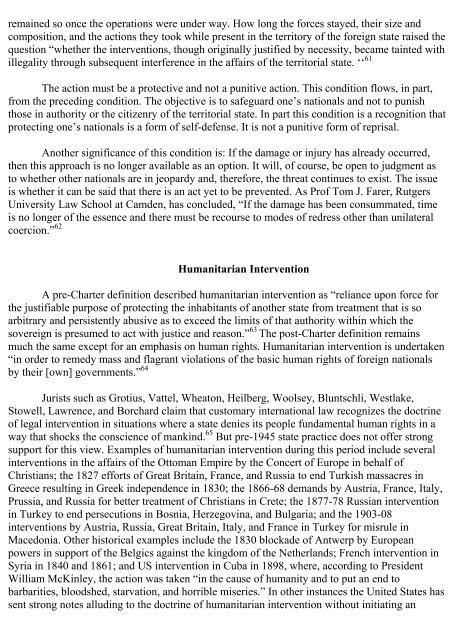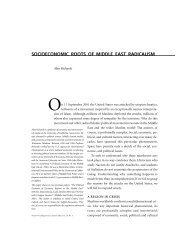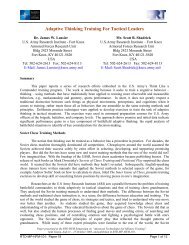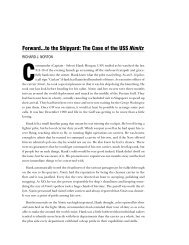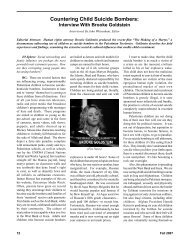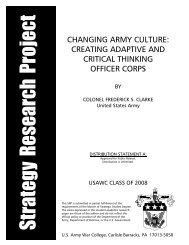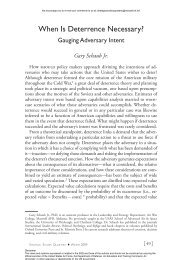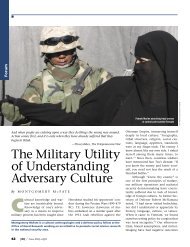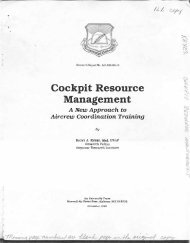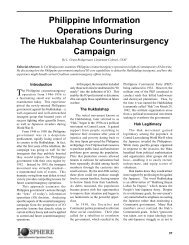Legitimate use of military force against state-sponsored - Air University
Legitimate use of military force against state-sponsored - Air University
Legitimate use of military force against state-sponsored - Air University
Create successful ePaper yourself
Turn your PDF publications into a flip-book with our unique Google optimized e-Paper software.
emained so once the operations were under way. How long the <strong>force</strong>s stayed, their size and<br />
composition, and the actions they took while present in the territory <strong>of</strong> the foreign <strong>state</strong> raised the<br />
question “whether the interventions, though originally justified by necessity, became tainted with<br />
illegality through subsequent interference in the affairs <strong>of</strong> the territorial <strong>state</strong>. ‘‘ 61<br />
The action must be a protective and not a punitive action. This condition flows, in part,<br />
from the preceding condition. The objective is to safeguard one’s nationals and not to punish<br />
those in authority or the citizenry <strong>of</strong> the territorial <strong>state</strong>. In part this condition is a recognition that<br />
protecting one’s nationals is a form <strong>of</strong> self-defense. It is not a punitive form <strong>of</strong> reprisal.<br />
Another significance <strong>of</strong> this condition is: If the damage or injury has already occurred,<br />
then this approach is no longer available as an option. It will, <strong>of</strong> course, be open to judgment as<br />
to whether other nationals are in jeopardy and, therefore, the threat continues to exist. The issue<br />
is whether it can be said that there is an act yet to be prevented. As Pr<strong>of</strong> Tom J. Farer, Rutgers<br />
<strong>University</strong> Law School at Camden, has concluded, “If the damage has been consummated, time<br />
is no longer <strong>of</strong> the essence and there must be recourse to modes <strong>of</strong> redress other than unilateral<br />
coercion.” 62<br />
Humanitarian Intervention<br />
A pre-Charter definition described humanitarian intervention as “reliance upon <strong>force</strong> for<br />
the justifiable purpose <strong>of</strong> protecting the inhabitants <strong>of</strong> another <strong>state</strong> from treatment that is so<br />
arbitrary and persistently abusive as to exceed the limits <strong>of</strong> that authority within which the<br />
sovereign is presumed to act with justice and reason.” 63 The post-Charter definition remains<br />
much the same except for an emphasis on human rights. Humanitarian intervention is undertaken<br />
“in order to remedy mass and flagrant violations <strong>of</strong> the basic human rights <strong>of</strong> foreign nationals<br />
by their [own] governments.” 64<br />
Jurists such as Grotius, Vattel, Wheaton, Heilberg, Woolsey, Bluntschli, Westlake,<br />
Stowell, Lawrence, and Borchard claim that customary international law recognizes the doctrine<br />
<strong>of</strong> legal intervention in situations where a <strong>state</strong> denies its people fundamental human rights in a<br />
way that shocks the conscience <strong>of</strong> mankind. 65 But pre-1945 <strong>state</strong> practice does not <strong>of</strong>fer strong<br />
support for this view. Examples <strong>of</strong> humanitarian intervention during this period include several<br />
interventions in the affairs <strong>of</strong> the Ottoman Empire by the Concert <strong>of</strong> Europe in behalf <strong>of</strong><br />
Christians; the 1827 efforts <strong>of</strong> Great Britain, France, and Russia to end Turkish massacres in<br />
Greece resulting in Greek independence in 1830; the 1866-68 demands by Austria, France, Italy,<br />
Prussia, and Russia for better treatment <strong>of</strong> Christians in Crete; the 1877-78 Russian intervention<br />
in Turkey to end persecutions in Bosnia, Herzegovina, and Bulgaria; and the 1903-08<br />
interventions by Austria, Russia, Great Britain, Italy, and France in Turkey for misrule in<br />
Macedonia. Other historical examples include the 1830 blockade <strong>of</strong> Antwerp by European<br />
powers in support <strong>of</strong> the Belgics <strong>against</strong> the kingdom <strong>of</strong> the Netherlands; French intervention in<br />
Syria in 1840 and 1861; and US intervention in Cuba in 1898, where, according to President<br />
William McKinley, the action was taken “in the ca<strong>use</strong> <strong>of</strong> humanity and to put an end to<br />
barbarities, bloodshed, starvation, and horrible miseries.” In other instances the United States has<br />
sent strong notes alluding to the doctrine <strong>of</strong> humanitarian intervention without initiating an


